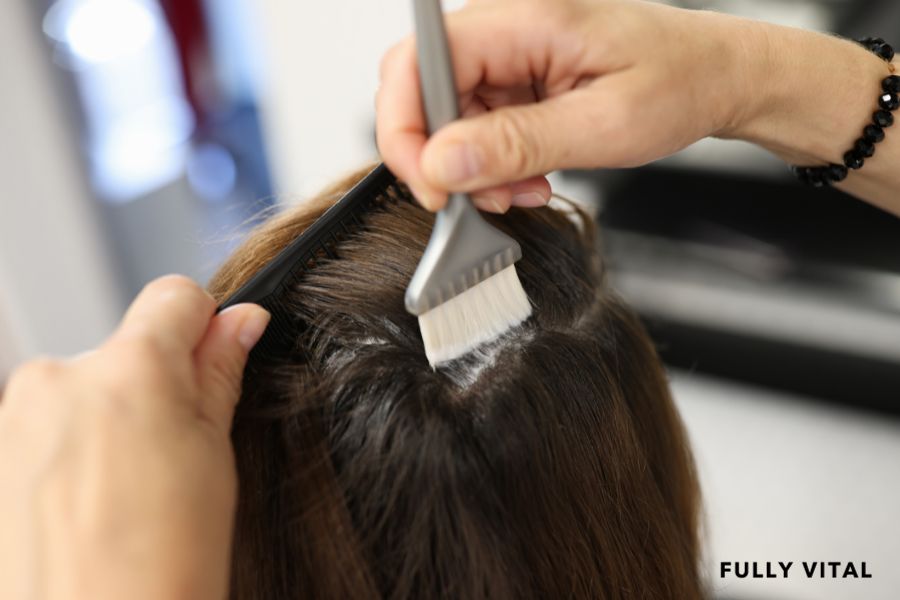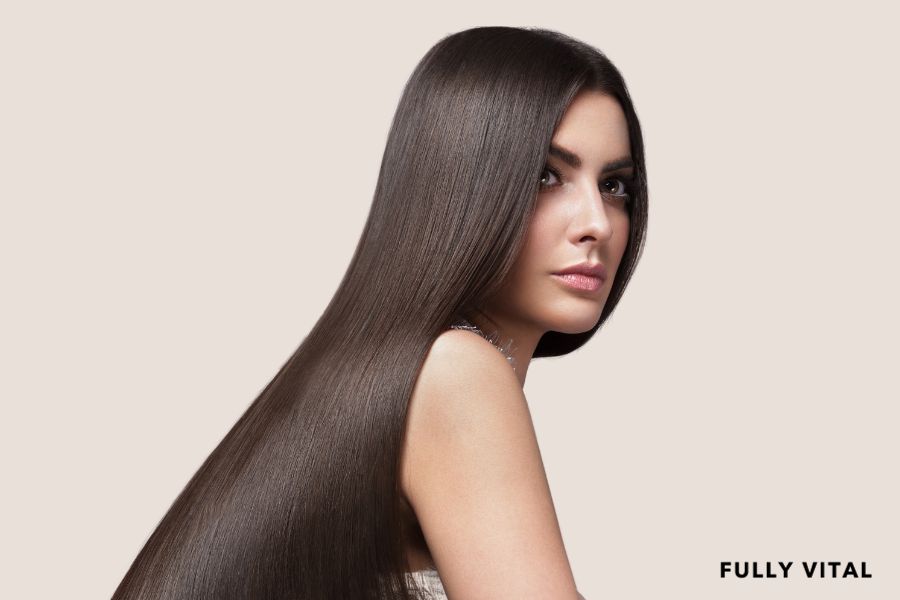
Hair Relaxers: Everything You Need To Know
Welcome to our comprehensive guide on hair relaxers – your go-to resource for understanding this hair care product.
Whether you're new to the world of hair relaxers or looking to learn more, we've got you covered.
In this article, we'll answer all your burning questions and provide insights into why hair relaxers are important, how they work, their benefits, potential downsides, and alternative options.

I LOVE MY HAIR NOW
FullyVital hair serum and hair vitamins made tremendous improvements in my hair. I truly love my hair now.
Dorit S.,
What Are Hair Relaxers?
Hair relaxers are chemical products designed to straighten and smooth out naturally curly or kinky hair.
They are particularly popular among women of all hair types looking to achieve a sleek and manageable appearance. Hair relaxers work by altering the hair's structure, breaking down the protein bonds that give it its natural curl or wave.(1)

Why Are Hair Relaxers Important?
Hair relaxers hold significant importance for individuals seeking a change in their hair texture.
They offer a convenient way to achieve straighter, more manageable hair, reducing the time and effort required for daily styling.
For many women, hair relaxers provide a boost in confidence, allowing them to embrace new hairstyles with ease.
How Do Hair Relaxers Work?
Hair relaxers work through a chemical process that involves applying a cream or lotion to the hair.
This product contains active ingredients, such as sodium hydroxide or calcium hydroxide, which break the disulfide bonds in the hair's protein structure.
This alteration leads to temporarily straightened hair.
The Process:
- Preparation: Hair is thoroughly washed and dried before application.
- Application: The relaxer is applied, starting from the roots and working down to the tips.
- Processing Time: The relaxer is left on for a specific duration, depending on the product's instructions.
- Rinsing: The relaxer is rinsed out, and a neutralizing shampoo is often used to stop the chemical action.
- Conditioning: Hair is conditioned to restore moisture and maintain its health.
What Are The Benefits Of Hair Relaxers?
Hair relaxers offer several benefits:
Straight Hair: Achieve the straight hair look you desire.
Manageability: Easier styling and reduced frizz.
Time-Saving: Spend less time on your daily hair routine.
Versatility: Experiment with different hairstyles.
Increased Confidence: Feel more confident with your new look.Are There Any Downsides To Hair Relaxers?
While hair relaxers have their advantages, it's essential to be aware of potential drawbacks:
Chemical Exposure
The process involves the use of chemicals that can be harsh on hair and scalp if not used correctly.
Hair Damage
Overuse or improper application can lead to hair damage, including breakage and thinning.
Maintenance
Regular touch-ups are required to maintain the straightened appearance.
Incompatibility
Not suitable for all hair types, and some individuals may experience adverse reactions.
What Are The Alternatives To Hair Relaxers?
If you're hesitant about using hair relaxers, there are alternative options to consider:
- Heat Styling: Use flat irons or straighteners to temporarily straighten hair.
- Keratin Treatments: These semi-permanent treatments can reduce frizz and make hair more manageable.(2)
- Natural Hair Care: Embrace your natural texture with specialized products and styling techniques.
- Protective Styles: Braids, weaves, and wigs can provide a break from chemical treatments.
What Is The Most Commonly Used Hair Relaxer?
When it comes to hair relaxers, there are several options available, but the most commonly used type is the lye-based relaxer.
Lye relaxers, also known as sodium hydroxide relaxers, have been popular in the market for years due to their effectiveness in straightening hair.(3)
However, it's important to note that lye relaxers can be harsh on the scalp and hair if not used correctly.
Is Keratin A Hair Relaxer?
No, keratin treatments are not hair relaxers. Keratin treatments, also known as Brazilian keratin treatments, are designed to reduce frizz and make hair more manageable.
They work by infusing the hair with a protein called keratin, which helps to smooth the hair shaft. Unlike relaxers, keratin treatments do not permanently alter the hair's structure, and the effects are temporary, lasting around 2-4 months.
Are Hair Relaxers Healthy?
The healthiness of hair relaxers depends on several factors, including the type of relaxer used, proper application, and maintenance. Here are some considerations:
Proper Application
When applied correctly and with care, hair relaxers can provide the desired results with minimal damage.
Chemical Exposure
Hair relaxers contain chemicals that can be harsh on the hair and scalp.
It's essential to follow the instructions, avoid over-processing, and wear gloves during application.
Regular Maintenance
Regular touch-ups and appropriate aftercare are necessary to keep hair healthy and minimize damage.
Alternative Options
If maintaining the health of your hair is a concern, you might consider alternative methods like natural hair care or less damaging treatments.
Which Hair Relaxer Is Safe?
The safety of a hair relaxer depends on various factors, including your hair type, sensitivities, and application technique.
To choose a safe hair relaxer:
- Consult a Professional: It's advisable to consult with a licensed hairstylist or dermatologist who can assess your hair and recommend a suitable product.
- Patch Test: Always perform a patch test before applying a relaxer to check for allergies or adverse reactions.
- Follow Instructions: Read and follow the manufacturer's instructions carefully to ensure safe application.
How Long Do Hair Relaxers Last?
The longevity of hair relaxers varies depending on factors such as hair type, product used, and maintenance.
Here's a general guideline:
- Initial Results: Hair relaxers typically provide straightened results that last for about 6-8 weeks.
- Touch-Ups: To maintain the straightened appearance, you'll need touch-up treatments every 6-8 weeks or as recommended by your stylist.
- Transition Period: If you decide to transition back to your natural hair texture, it may take several months for the relaxed hair to grow out completely.
Unlock The Secret To Youthful HairDiscover the power of Fully Vital's science-backed hair growth products. Our mission is to help you embrace a healthier, more vibrant relationship with your locks by slowing down and reversing the aging process. Experience the Benefits:
Elevate your hair care routine with Fully Vital. Your journey to timeless, beautiful hair starts here. |
Final Thoughts On Hair Relaxers
We've explored the world of hair relaxers, delving into their definition, importance, and the questions that often surround them.
From understanding their historical significance to examining the current landscape and peering into the future of hair relaxers, it's clear that these products have left an indelible mark on the beauty industry.
At Fully Vital, we're committed to helping you cultivate a healthy and vibrant relationship with your hair.
Our range of hair growth products is designed to combat the effects of aging, ensuring that your locks remain luscious and strong.
Whether you're considering a hair relaxer or exploring alternative solutions, we're here to provide guidance and support on your hair care journey.
Remember, the health and beauty of your hair are paramount, and our products are tailored to enhance your natural beauty while promoting hair vitality.
If you have any questions or seek personalized advice, don't hesitate to reach out to our team of experts. Your path to healthier, more beautiful hair begins here.
Frequently Asked Questions About Hair Relaxers
Can hair relaxers cause hair loss?
Hair relaxers, if used incorrectly or excessively, can potentially lead to hair loss.
Over-processing, improper application, and failure to follow recommended wait times between treatments can weaken the hair shaft, causing breakage and hair loss.
How long does a hair relaxer treatment last?
The duration of a hair relaxer's effects can vary, but it typically lasts for about 6-8 weeks. Regular touch-ups are needed to maintain the straightened appearance.
Can I use hair relaxers on damaged or previously processed hair?
It's generally not recommended to use hair relaxers on already damaged or heavily processed hair, as it can lead to further damage.
Consult with a professional stylist for personalized advice.
Are there any safety precautions I should take when using hair relaxers at home?
When applying hair relaxers at home, it's crucial to follow the product's instructions carefully.
Always wear gloves, avoid contact with the scalp, and perform a patch test to check for potential allergies or sensitivities.
Can I color my hair after using a relaxer?
It's best to wait at least two weeks after a relaxer treatment before coloring your hair. Coloring immediately after a relaxer can lead to hair damage.
Are there natural alternatives to hair relaxers?
Yes, there are natural methods to temporarily straighten hair, such as using hot oil treatments, blow-drying with a round brush, or applying natural hair masks.
Can I use hair relaxers during pregnancy or while breastfeeding?
The use of hair relaxers during pregnancy or while breastfeeding is a topic of concern.
The chemicals in hair relaxers can potentially be absorbed through the scalp and may pose risks to the developing fetus or nursing baby.
How soon can I wash my hair after a hair relaxer treatment?
After a relaxer treatment, it's essential to wait at least 48 hours (two days) before washing your hair.
This waiting period allows the relaxer to set properly and reduces the risk of washing out the chemicals prematurely.
Are there specific shampoos and conditioners I should use after a hair relaxer treatment?
Yes, it's advisable to use shampoos and conditioners formulated for chemically treated hair.
Look for products labeled as "for relaxed hair" or "moisturizing and strengthening" to help maintain the health and integrity of your relaxed hair.
Can I swim in chlorinated water or saltwater after a hair relaxer treatment?
It's best to avoid swimming in chlorinated pools or saltwater immediately after a relaxer treatment.
These types of water can strip moisture from your hair and potentially affect the relaxer's longevity.
Sources:
- Khumalo, N. P., Stone, J., Gumedze, F., McGrath, E., Ngwanya, M. R., & de Berker, D. (2010). “Relaxers” damage hair: Evidence from amino acid analysis. Journal of the American Academy of Dermatology, 62(3), 402–408. https://doi.org/10.1016/j.jaad.2009.04.061
- Keratin hair treatment: Overview, benefits, care, and more. (2022, May 31). Www.medicalnewstoday.com. https://www.medicalnewstoday.com/articles/keratin-hair-treatment
- Hatsbach de Paula, J. N., Basílio, F. M. A., & Mulinari-Brenner, F. A. (2022). Effects of chemical straighteners on the hair shaft and scalp. Anais Brasileiros de Dermatologia, 97(2), 193–203. https://doi.org/10.1016/j.abd.2021.02.010






